MASNEWS 3/2010: Of Celebrations and Revolutions
Thesis Time at the HCA
Welcome to the MAS – Christmas in Heidelberg
HCA students go hiking at this year’s first TGIF
The HCA Welcomes Günter Leypoldt
Egypt’s Revolution from Within
Exhibition "The Civil Rights Struggle, African-American GIs, and Germany"
Upcoming Events at the HCA
Dear All,
 Welcome to the Heidelberg Center for American Studies’ MAS newsletter!
Welcome to the Heidelberg Center for American Studies’ MAS newsletter!
This edition covers some exciting news on the institute and its students. We take a look at the theses of our MAS students who are going to graduate in April and welcome Mahmoud Abdou, one of the new students of the MAS Class of 2012. Mohamed Metawe of the Ph.D. Class of 2011 reports on the revolutionary events in his home country and we are happy to announce the opening of the exhibition “The Civil Rights Struggle, African-American GIs, and Germany,” which was curated in cooperation with the German Historical Institute in Washington D.C. and Vassar College. In addition, we take a look back at the first MAS TGIF of the New Year and the celebrations surrounding the HCA’s second joint appointment in cooperation with the English department.
Please feel free to forward our newsletter to anyone interested in American Studies. Of course, we appreciate any feedback you would like to share with us.
Many thanks and best wishes,
Prof. Dr. Dr. h.c. Detlef Junker
HCA Founding Director
Thesis Time at the HCA
On January 31, the students of the MAS Class of 2011 had to hand in their MA theses. Unlike previous years, when “thesis time” was in summer, the new three semester MAS program no longer forces students to choose between Neckarwiese and studying. Without such distractions the MAS students stayed on track and delivered a broad range of promising research reflecting the interdisciplinary approach of the program.
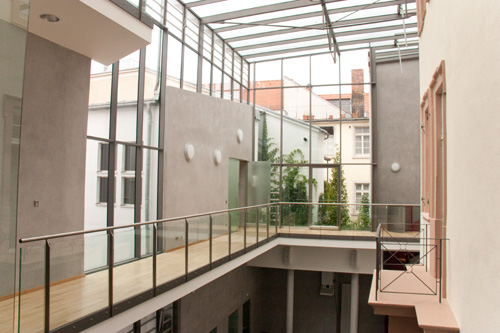
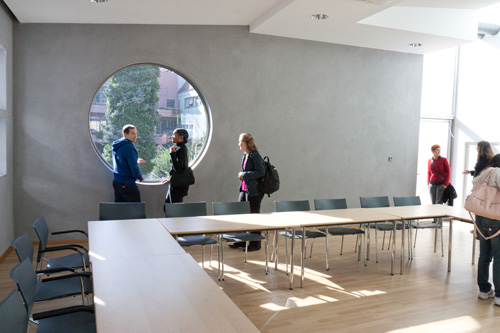
This year’s theses represent a broad range of topics and fields. No less than four theses revolve around the topic of immigration to the U.S, ranging from the question how H-1B Visas lead to America’s rise as an information technology leader, as well as specific studies on certain immigrant groups such as Albanian, Chinese or Vietnamese. The projects do not only concentrate on the immigrants’ stories in the New World but also analyze their influence on the respective countries of origin. From the large variety of socio-political studies, some projects use a socio-cultural approach. Two theses are comparing the religious convictions of Presidents Kennedy and Obama as well as those of Jimmy Carter and George W. Bush and connect those beliefs to perceptions of race and religion, or ask if their beliefs had any influence on their foreign policy. Other projects focus on questions of gender, race and cultural identity. One thesis asks the question “What does it mean to be an American,” while another one uses magazines for teenage girls as a source for a cross-cultural study on the formation of gender roles and identity in both the U.S. and Turkey.
Besides such attempts on rather modern academic fields some theses focused their research on classical topics of U.S. foreign and domestic policy, such as the role of war as a driving factor for social progress, the liberal ideals of the Founding Fathers or the diplomatic triangle between China, Japan and the United States.
All in all the MAS team received 19 theses from HCA students. The students, their families and HCA faculty will celebrate the MAS Commencement on April 8, 2011, in the Alte Aula of Heidelberg University.
Welcome to the MAS – Christmas in Heidelberg
Mahmoud Abdou is part of the new MAS Class of 2012, which was welcomed at the HCA in September 2010. Mahmoud is from Palestine and has received his B.A. in Political Science from Middlebury College in 2010. For the MAS Newsletter he reports on his first Christmas in Heidelberg.
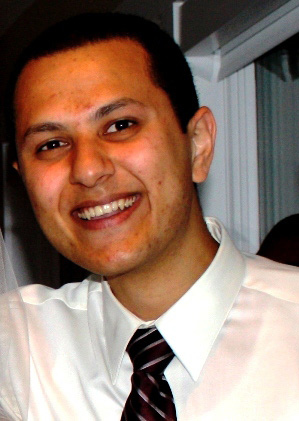
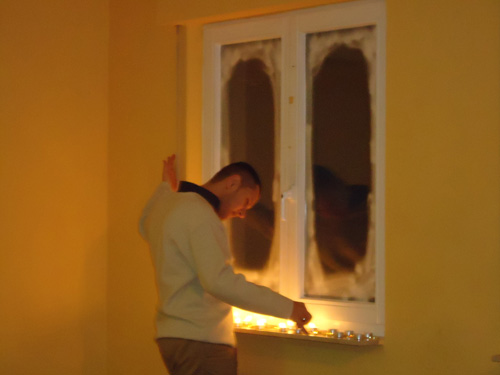
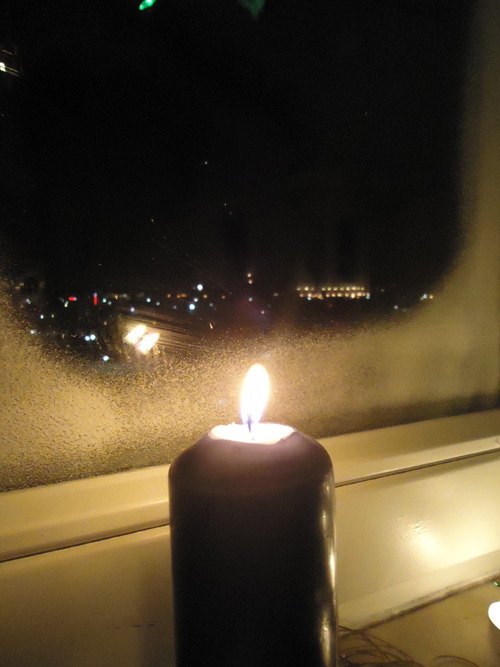
Last Christmas break was one of the most relaxing ever. There is something about Heidelberg that is simply peaceful. I spent the last three to four months before coming here moving from Vermont to Missouri in the U.S., then I went back to Gaza and from there I had to travel across the Sinai desert to Cairo Airport, from where I flew to Germany. Needless to say, I came here feeling a little disoriented and with so much to think about. However, it did not take me so long to get used to the new place. Spending the break here in this beautiful city of Heidelberg gave me more than I could have ever asked for: peace of mind, great friends around and a taste of snow!
I went to Strasbourg with a couple of friends from the HCA and I spent Christmas and New Year’s Eve in the company of wonderful people from all over the world. I also got the chance to meet with one of my classmates from the U.S. as she drove through Germany with her family. This is my eighth year studying abroad since I left Gaza in 2003 to pursue my IB Diploma in Norway. Christmas is the time of year that I have come to love and appreciate as the time for family and friends. Maybe my family is more than a thousand miles away, but the warmth of Heidelberg and the wonderful people I have met here through the HCA are sure making this place feel like home!
HCA students go hiking at this year’s first TGIF
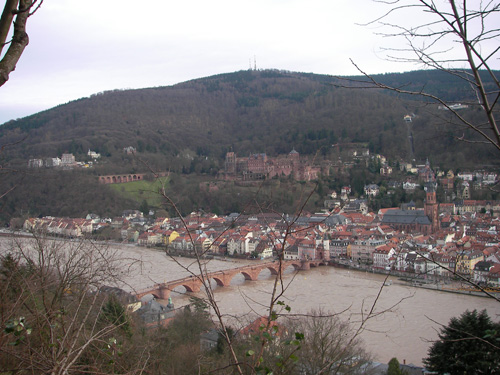
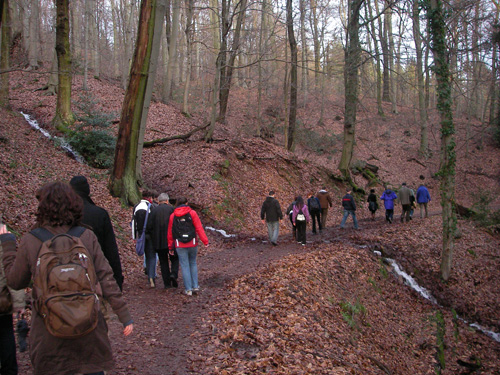
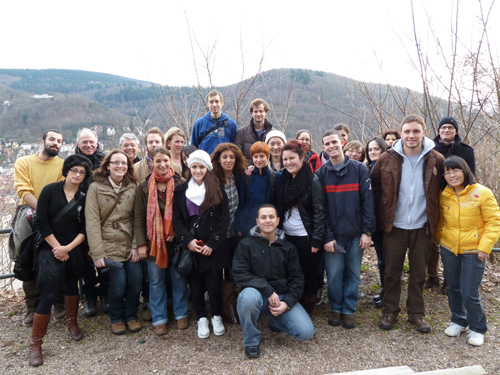
For the January TGIF, HCA students from the classes of 2011 and 2012, a few BA students, and most faculty and staff hiked to the Klosterhof Neuburg, an organic farm and porterhouse that is operated in consultation with the still existing Benedictine abbey going back to the year 1130. During the beautiful walk up the Philosophenweg, we took to conversation, and many of us got to know each other better along the way. At the Klosterhof, we had some great food and drinks, with only a few of us able to resist having a taste of the beer from the monastery’s brewery. It was a great opportunity to talk with professors, staff, and classmates on a social level, and learn that many of us have similar interests. Everyone had a swell time.
Further News from the HCA
The HCA Welcomes Günter Leypoldt
On February 17, the Heidelberg Center for American Studies officially welcomed Prof. Dr. Günter Leypoldt who now holds a joint appointment at both the HCA and the English Department. During a small celebration in the HCA’s Lounge, attended, inter alia, by the Rector of Heidelberg University, Prof. Dr. Bernhard Eitel, and the Dean of the Faculty of Modern Languages, Prof. Dr. Christiane von Stutterheim, HCA founding director Prof. Dr. Detlef Junker expressed his gratitude for the successful cooperation between the HCA and the English Department and the stronger institutional ties now manifested. “I am delighted that Professor Leypoldt will enrich the HCA’s intellectual capacities and contribute to its multidisciplinary approach,” emphasized Professor Junker.
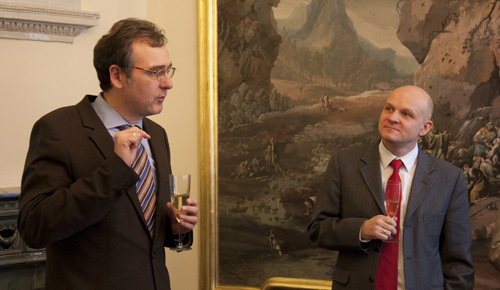

Günter Leypoldt holds degrees in American, British, and German literatures from Cape Town (B.A.) and Tübingen (doctorate and habilitation). He taught American Studies at the universities of Tübingen (2001-2007), Maryland–College Park (2003), and Mainz (2007-2009) before coming to Heidelberg. He has published on literary transcendentalism, eighteenth- and nineteenth-century aesthetics, and twentieth-century literary and cultural theory. His present research interests include transatlantic romanticism and modernism, American pragmatism, transculturality, the borders between aesthetic and religious experience, and the sociology of knowledge formation. Professor Leypoldt joined the HCA Board of Directors in 2009. His is the second joint appointment after Prof. Dr. Manfred Berg, Curt Engelhorn Chair for American History, in April 2010. Two more joint appointments in geography and theology will soon strengthen the HCA’s institutional ties even further.
Egypt’s Revolution from Within
Mohamed Metawe, who has been enrolled in the HCA’s Ph.D. program since 2008 gives a firsthand account on the events in Cairo during the Egyptian Revolution this February.
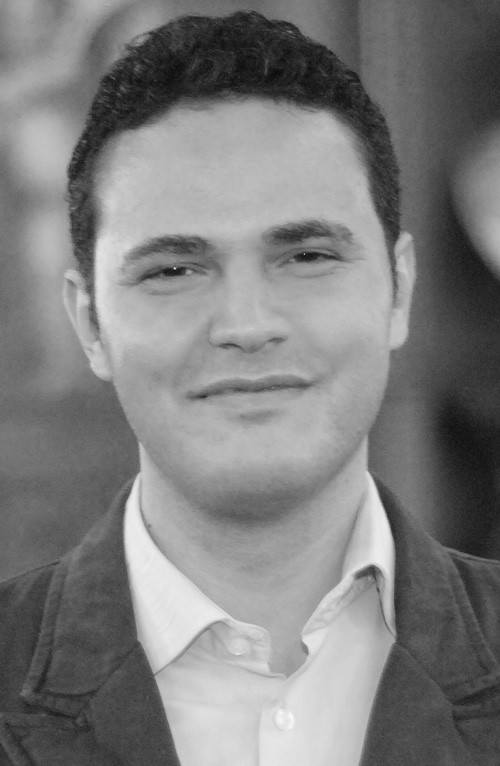
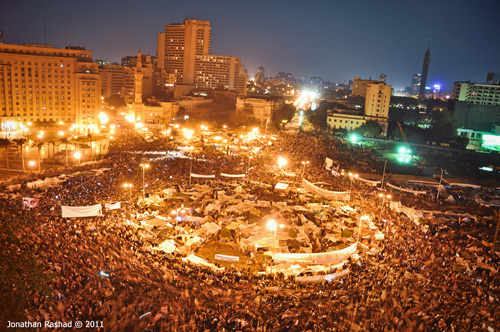
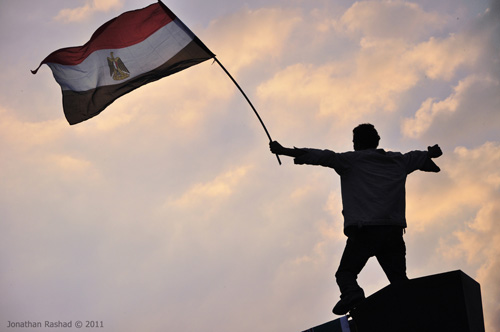
“Raise your head high … you are Egyptian!” This was the chant of all Egyptians when Mubarak stepped down on February 11, 2011. Neither the protesters in Tahreer Square nor I, an eye witness to the revolution, expected that this uprising, which had started spontaneously and peacefully, would lead to the results we are witnessing today. It began as a normal day of protest on January 25, 2011, an anniversary celebrated by the Egyptian Police. The protesters chose this day to denounce the atrocities committed by the Egyptian police against citizens who called for freedom and attempted to expose police abuses of human rights. One major victim of police abuse was Khalid Said. Tens of thousands of Egyptian Facebook users adopted his cause and gathered in a group called “We are all Khalid Said” as a sign of uniformed anger against the Mubarak regime. However, it were the police atrocities three days later that sparked the revolution. The Egyptian police killed more than 350 protesters and used its entire arsenal to dispel the masses. Nevertheless, the protesters amassed to more than four million and the police forces collapsed. Therefore, the Egyptian army was authorized to take control as the police vanished and many prisoners escaped.
A violent campaign of looting, killing, and intimidation followed because most police stations were destroyed, prisoners set free, and the security apparatus had ceased to exist. Therefore, many ordinary people, including me, started to gather arms - knives, sticks, all that could be used to defend ourselves and our homes. These groups of people become known as “popular committees.” We had rotating shifts, watching and guarding our homes, and we gathered in large groups to stop all cars and people in the street to check their identities and whether they were armed or not. It was quite dangerous because we caught criminals and delivered them to the army. Politically, the situation deteriorated because the protesters’ demands increased from asking for reforms to asking for a complete collapse of the system, symbolized by the resignation of Mubarak. For eighteen days, we heard chats like: “the people want the system down,” “the people want Mubarak to step down.” Although Mubarak made numerous concessions, such as reshuffling the cabinet, changing the constitution, and delegating authority to his Vice-president, these proved to be too late. The protesters said if he was honest, he would have brought about these reforms during the preceding 30 years of his rule.
I am proud to be an Egyptian because Egypt will now be a genuine democracy even though the costs - chaos, insecurity, and economic deterioration - are a very high price to pay. The bottom-line is that Egypt’s freedom and pride are priceless and much more important than the economy.
Exhibition "The Civil Rights Struggle, African-American GIs, and Germany"
On March 15, the exhibition “The Civil Rights Struggle, African-American GIs, and Germany” opens at the HCA. Until recently, the story of the African-American civil rights movement has been told largely within the context of American history. Curated by Maria Höhn (Vassar College) and Martin Klimke (German Historical Institute, Washington, D.C. / Heidelberg Center for American Studies, University of Heidelberg), this exhibition now shows how Germany emerged as a critical point of reference in African-American demands for an end to segregation and for equal rights.
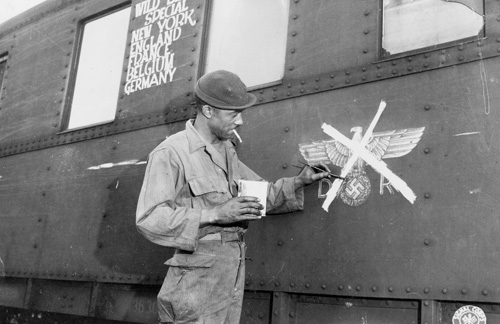
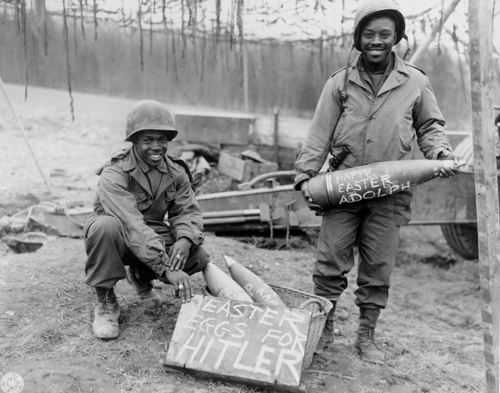
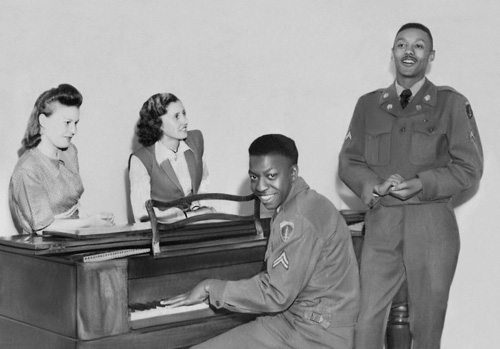
From as early as 1933, African-American civil rights activists used white America’s condemnation of Nazi racism to expose and indict the extent of Jim Crow racism at home and to argue that “separate” can never be “equal.” America’s entry into World War II allowed these activists to step up their rhetoric significantly and to call for an end to segregation. Drawing on the experience of soldiers stationed in Germany, these activists claimed that it was in post-Nazi Germany that black GIs found the equality and democracy denied to them in their own country. Once the civil rights movement gained momentum in the late 1950s, black GIs deployed overseas became crucial actors in the civil rights struggle. By the early 1960s, sit-ins to integrate lunch counters were taking place not only in Greensboro, N.C., but also in establishments on and around U.S. military bases in Germany.
After Dr. Martin Luther King Jr.’s visit to Berlin in 1964, the rise of the Black Power movement, and solidarity campaigns for Angela Davis in both East and West Germany in the early 1970s, African-American GIs intensified their collaboration with German student activists to fight racism both in the U.S. military and in German communities.
Since 1945, almost 20 million American soldiers, along with their families and civilian employees, have served tours of duty in Germany; about 3 million of those Americans were African-American. By illustrating the untold story of African-American GIs and the transnational implications of the civil rights movement, this exhibition hopes to advance a more nuanced and sophisticated sense of how America's struggle for democracy reverberated across the globe. It presents the first results of a joint research initiative of the German Historical Institute, Vassar College, and the HCA. In 2009, the project was honored by the National Association for the Advancement of Colored People (NAACP) with the Julius E. Williams Distinguished Community Service Award.
Please visit www.aacvr-germany.org for the Digital Archive, including photographs, videos, and oral history, and www.aacvr-germany.org/exhibition for more information on the exhibition.
Upcoming Events at the HCA
March 15, 2011, HCA – 6 pm
Exhibition Opening - "The Civil Rights Struggle, African-American GIs, and Germany“
March 17, 2011, HCA – 6.15 pm
Lecture by Hartmut Berghoff (Director GHI Washington) - “Lässt sich der Kapitalismus zähmen? Die Anfänge des 'Credit Rating' in den USA und Deutschland vor 1914“
March 21-25, 2011, HCA
8th HCA Spring Academy on American History, Culture & Politics
March 31, 2011, HCA – 5 pm
University Hour - "Bridges to the New World: Meet the HCA's Partners on the Other Side of the Atlantic – A Video Conference"
April 8, 2011, Alte Aula der Universität Heidelberg – 6 pm
His Excellency Philip D. Murphy, United States Ambassador to the Federal Republic of Germany - "Winning the Future: Global Prosperity in the Twenty-First Century" – Commencement Speech MAS Class of 2011


 Graduiertenkolleg
Graduiertenkolleg